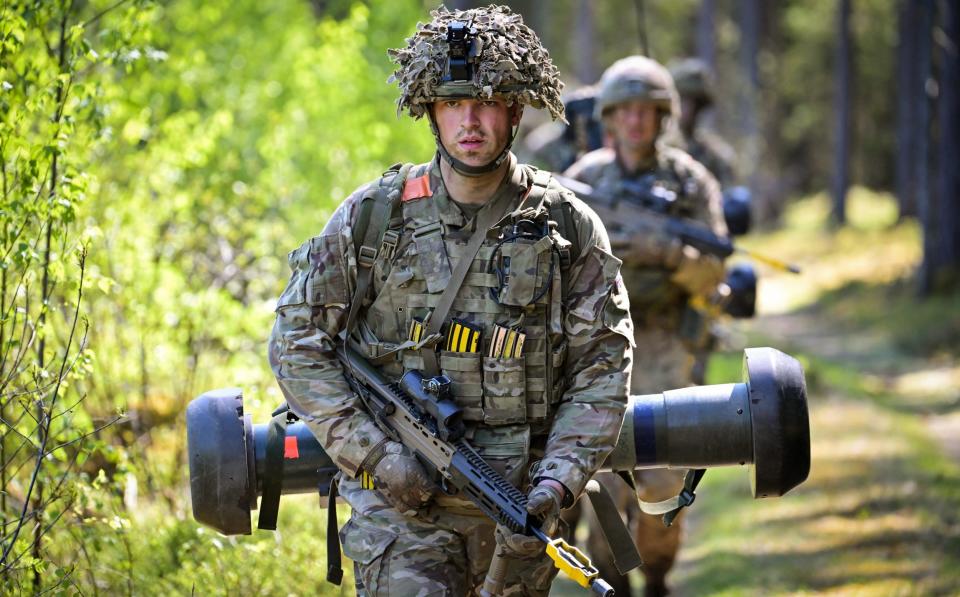Britain to commit 2,000 extra troops to Estonia as Nato ramps up defence

Britain will commit an extra 2,000 soldiers to defending Estonia under new Nato plans, the Defence Secretary has announced.
Speaking at the Nato summit in Madrid, Ben Wallace said that the existing battlegroup deployment of about 900 soldiers would be permanently increased to brigade strength, taking the total committed force to about 3,000 troops in all.
Not all units are expected to be based in the Baltic country at the same time, with some troops held on standby in the UK.
Numbers in Estonia will be increased only in the event of heightened tensions with Russia, although the headquarters element is expected to be permanently stationed forward.
Mr Wallace said: “If your brigade headquarters is forward and you have a battlegroup in the position, it is very quick to surge … and allows us to very quickly expand to three battlegroups”.
“How forward and permanent we’ll be there… will all be worked out in [Nato’s] regional plans between now and Christmas. We stand ready to do that [in 2023].”
The move matches a commitment from Germany, which has allocated a high readiness brigade for the defence of Lithuania, albeit without sending the units into the country on a permanent basis.
The British brigade to be given the Estonia mission, yet to be named by military chiefs, will be able to train and be equipped for a very specific role, with units rotating through the country probably on a six-month basis.
Under Nato’s Enhanced Forward Presence mission, launched in 2016 after Russia’s invasion of Ukraine two years earlier, battlegroups from across the alliance have been stationed in Estonia, Latvia, Lithuania and Poland.
The mission was expanded to cover Hungary, Bulgaria, Slovakia and Romania after the war began on Feb 24.
Britain is responsible for the battlegroup of about 900 troops in Estonia. This number is currently doubled as the Royal Welsh unit has remained in post, extending its six-month tour in light of the latest Russian attack.
The commitments are part of Nato’s response to the invasion of Ukraine and seek to reassure allies on the eastern flank of the alliance that their security concerns are understood.

After witnessing war crimes and scenes of destruction in areas of Ukraine that had been temporarily held by Moscow’s forces, Nato’s plans to liberate any territory invaded by Russia after 180 days have been widely criticised by Baltic leaders, most recently Kaja Kallas, the prime minister of Estonia.
Mr Wallace said that the Nato spending target, requiring each member state to spend two per cent of GDP on defence, had been set “for a different era”.
He declined to put a figure on what Britain’s defence budget should be, adding only that it should be set by “the threat and the Government’s ambition”.
However, responding to the Government’s suggestion that defence spending is projected to reach 2.3 per cent of GDP this year, the Defence Secretary said Number 10 had been clear that figure included £1.3 billion of extraordinary support for Ukraine.
“Number 10 does say ‘if you include the extra Ukrainian spend’, they have put a caveat to that,” Mr Wallace said.
“Of course, it isn’t core defence spending. It is not my core budget, it doesn’t buy me any more planes, tanks or ships. It is obliquely helping Britain’s defence budget because we’re helping Ukraine, but they do caveat it.
“I’m pretty relieved that it was extra money, rather than [me] having to find from within my budget another billion pounds.”
He added: “I don’t care how the money is labelled or where the other money comes from. Fundamentally, it is now helping Ukraine defeat Russia and a worn-out Russian army is a definite, medium- and long-term benefit for the United Kingdom.”

